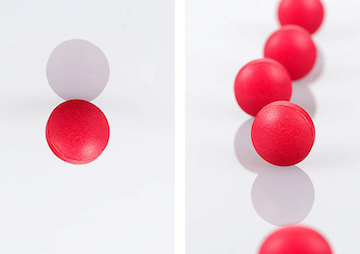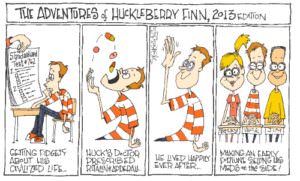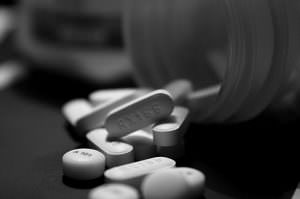Big Pharma Sells Risky Meds We Don’t Need for Disorders It Made Up That We Don’t Have
Medical societies and paid drug industry researchers have loaded society up with new definitions of alleged ill health from which drug companies can profit when millions of otherwise well people are labeled as ailing. F.d.r. Jones / (CC BY-ND 2.0)
F.d.r. Jones / (CC BY-ND 2.0)
“Intermittent explosive disorder.” “Overactive bladder disorder.” Professional medical societies and paid drug industry researchers have loaded society up with new definitions of alleged ill health from which drug companies can profit when millions of otherwise well people are labeled as ailing.
“In 2003 and again in 2010,” for example, write MedPage Today editor Kristina Fiore and Milwaukee Journal reporter John Fauber, “the American Diabetes Association tinkered with the definition of a condition known as prediabetes, which independent doctors say is an unneeded label that has led to overtreatment with drugs, exposing patients to risks without proof of real benefit.”
“The changes, which twice lowered the threshold for hemoglobin A1C, increased the number of people fitting the diagnosis from 17 million to 87 million. Indeed, a March report from the UCLA Center for Health Policy Research estimated that 46% of Californians — 13 million people — had prediabetes.”
“A Journal Sentinel/MedPage Today investigation found the ADA has long received more than $7 million in current annual funding. In addition, nine of the 14 experts who authored the 2010 change worked as speakers, consultants or advisers to companies that marketed diabetes medicines.”
In one instance, all five authors of a report reviewed by Fiore and Fauber had ties to a drug company that stood to profit from the study’s “findings.”
Some of the new disorders include hypoactive sexual desire disorder, for women with sex drives; adult attention deficit hyperactivity disorder, for adults who have trouble focusing at work; overactive bladder disorder, for adults with a frequent urge to urinate; and premenstrual dysphoric disorder, for women who have difficulty with the basic tasks of life around the same time every month.
A look at how “incontinence” became the more sweeping “overactive bladder disorder” provides a view into the “playbook for selling disease,” write Fiore and Fauber.
“You de-stigmatize the condition, broaden it to include a much larger patient population, rebrand it or give it a name that is less embarrassing to people — people would rather have overactive bladder than be called incontinent,” [said Carl Elliott, MD, PhD, professor of bioethics at the University of Minnesota]. “Then you’re all set for selling your treatment.”
It was in the late 1990s that a condition once known as incontinence or “unstable bladder” became the nicer-sounding “overactive bladder.” Two urologists thought the new name was “more intuitive” and sounded less like a psychiatric disorder. They convinced the International Continence Society to give it a new definition, and pushed related research that the new condition affected 33 million people.
One of the two urologists, Alan Wein, MD, PhD, of the University of Pennsylvania, now acknowledges the estimates “overstate the market,” but noted many patients do have bladder issues that require treatment.
Kari Tikkinen, MD, PhD, a urologist and clinical epidemiologist at the University of Helsinki in Finland, researched overactive bladder and found the estimates of how many have it — 17% of adults — were vastly inflated. In his view, the real figure is less than half that.
As a result of these efforts by the medical-industrial complex, many people who are not ill come to believe they are. And they spend money and risk being harmed by drugs they don’t need.
—Posted by Alexander Reed Kelly.
Your support matters…Independent journalism is under threat and overshadowed by heavily funded mainstream media.
You can help level the playing field. Become a member.
Your tax-deductible contribution keeps us digging beneath the headlines to give you thought-provoking, investigative reporting and analysis that unearths what's really happening- without compromise.
Give today to support our courageous, independent journalists.





You need to be a supporter to comment.
There are currently no responses to this article.
Be the first to respond.